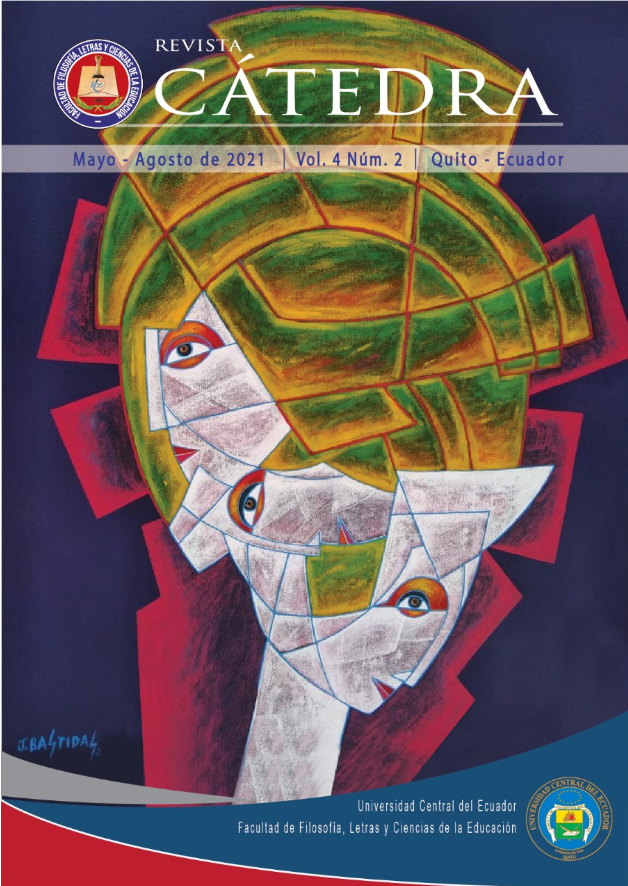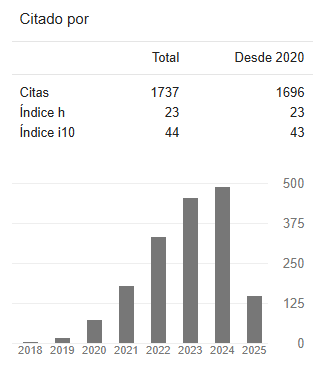Gender roles in the fang family concept: a differential socialization system
DOI:
https://doi.org/10.29166/catedra.v4i2.2924Keywords:
family, gender, patriarchy, role, socializationAbstract
This article focuses on making visible the gender roles, products of the differential socialization of the concept of the Fang family. This fundamental objective shows that since the family is an institution where the first socialization of people takes place, the Fang family model is not far from this standard, because the way of socialization within this culture makes men be assigned different roles than women. This is notably seen in the sexual division of labor that is very present in the concept of the Fang family, thus perpetuating the differential socialization system that drives and aggravates social inequalities, motivated by sex-gender. In this sense, we find that domestic tasks and private space correspond exclusively to women, while men occupy public space. A society governed by this differential socialization system creates an imbalance where women end up being minimized. In order to better study this issue, a quantitative methodology has been used, based on the descriptive method, which has made it possible to reflect the incidence of this phenomenon in the selected population group. This research reaffirms that traditional gender roles are promoted in different ways within the concept of the Fang family, fostering an education of dependence, where the cognitive and personal skills of women are always undervalued by the Fang patriarchal system.
Downloads
References
Ki-Zerbo, J. (1972). Historia de África Negra 2 Vols. Lisboa: Europa-América.
Mbiti, J. (1990). Entre Dios y el tiempo. Religiones tradicionales Africanas. Madrid: Mundo Negro.
Musitu, G., & Cava, M. J. (2001). La familia y la educación. Barcelona: Ediciones Octaedro, S.L.
Meil Landwerlin, G. (2006). Padres e hijos en la España actual. Barcelona: Edita Fundación La Caixa.
Papalia, D. (2005). Psicología del desarrollo. México: McGraw-Hill.
Maurier, H. (1966). “Religión y desarrollo: Tradiciones Africanas y Catequesis”. Cuadernos Mundo Negro 4.
Castells, M. (1998 ). La era de la información. México: Siglo XXI.
Scott, C. E. (2005). Sobre Los lazos de amor. Psicoanálisis, feminismo y el problema de la dominación de Jéssica Benjamín. Gaceta Universitaria: Temas y controversias en Psiquiatría, pp. 16-19.
Mibui, R. E. (2005). Historia de Guinea Ecuatorial: período pre-colonial. Madrid: Gráficas Algoran.
Lamas, M. (1995). La perspectiva de género. Revista de Educación y Cultura de la sección 47 del SNTE, pp.14-20.
Oyono Nzang, J. E. (2013). El hombre en busca de su Dios. Amigo del Hogar.
Bourdieu, P. (2000). La dominación masculina. Barcelona: Anagrama.
Anadón, M. (2008). La investigación llamada "cualitativa": de la dinámica de su evolución a los innegables logros y los cuestionamientos presentes. Investigación y Educación en Enfermería, XXVI(2), 198-211.
Pérez, G. (2000). Investigación cualitativa, retos e interrogantes II, técnicas y análisis de datos. España: Editorial la Muralla.
Myers, D. G. (2006). Psicología. Buenos Aires: Médica Panamericana.
Ares-Muzio, P. (2002). Psicología de la Familia. Una aproximación a su estudio. La Habana: Féux Várela.
Nvé-Bengobesama, C. O. (1981). Tradiciones del pueblo fang. Madrid: RIALP, S.A.
Monjas-Casares, M. I. (2004). Ni sumisas ni dominantes: Los estilos de relación interpersonal en la infancia y la adolescencia. España: Ministerio de Trabajo y asuntos Sociales.
Pérez-Armiño, L. (2018). "Y el sujeto se hizo verbo (aunque siempre fue objeto). La mujer fang en Guinea Ecuatorial y el impacto colonial". Anales del Museo Nacional de Antropología, XX. Madrid: Ministerio de Educación, Cultura y Deporte, pp. 30-59.
Nzé-Abuy, R. M. (1985). Familia y matrimonio fán. Madrid: Anzós S. A.
Santelices-Cuevas, L. (2001). La familia desde una mirada antropológica: Requisito para educar. Pensamiento Educativo. Vol. 28, pp.183-198.
Melibea-Obono, T. (15 de Diciembre de 2016). "En España me llaman "la negra", en Guinea Ecuatorial "la españolita". Obtenido de Recuperado el 10 de julio de 2020, de https://www.abc.es/cultura/cultural/abci-trifonia-melibea-obono-espana-llaman-negra-guinea-ecuatorial-espanolita-201612121313_noticia.html
Martínez- González, R.-A. (1996). Familia y Educación. Oviedo: Servicios de Publicaciones Universidad de Oviedo.
Rodríguez- Pérez, A. (2007). Principales modelos de socialización familia. Foro de educación nº 9, pp. 91-97.
Downloads
Published
Versions
- 2021-10-21 (2)
- 2021-05-26 (1)









